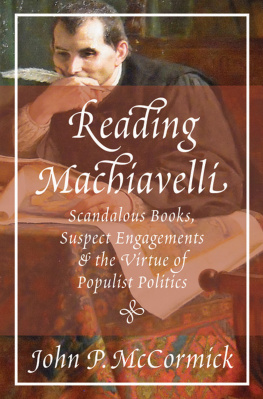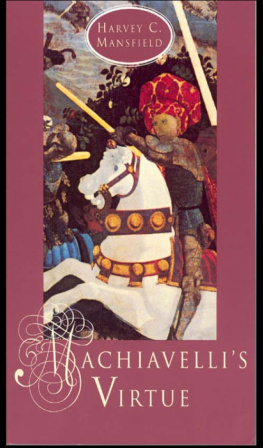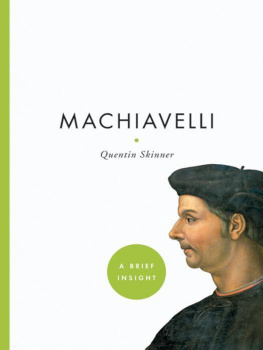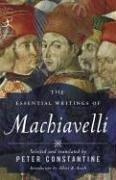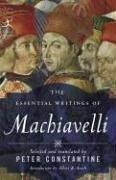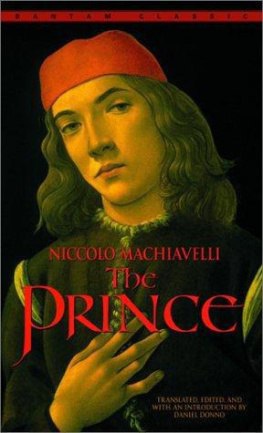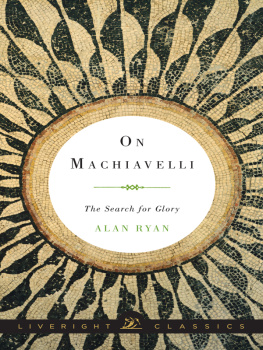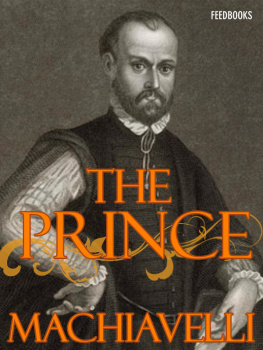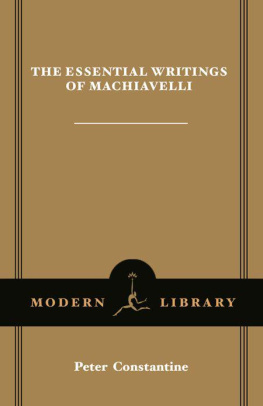
READING MACHIAVELLI
Reading Machiavelli
SCANDALOUS BOOKS, SUSPECT ENGAGEMENTS, AND THE VIRTUE OF POPULIST POLITICS
JOHN P. MCCORMICK
PRINCETON UNIVERSITY PRESS
PRINCETON & OXFORD
Copyright 2018 by Princeton University Press
Published by Princeton University Press
41 William Street, Princeton, New Jersey 08540
6 Oxford Street, Woodstock, Oxfordshire OX20 1TR
press.princeton.edu
All Rights Reserved
Library of Congress Control Number 2018935644
ISBN 978-0-691-18350-3
British Library Cataloging-in-Publication Data is available
Editorial: Rob Tempio and Matt Rohal
Production Editorial: Jill Harris
Jacket Design: Pamela Schnitter
Jacket Credit: Stefano Ussi, Niccol Machiavelli in his study, 1894.
Production: Jacqueline Poirier
Copyeditor: Lynn Worth
This book has been composed in Arno
Printed on acid-free paper.
Printed in the United States of America
10 9 8 7 6 5 4 3 2 1
For Alyssa
I will say something that will seem crazy to you; I am going to propose a plan that will seem to you either foolhardy or ridiculous. Nevertheless, the times require audacious deliberations, unusual, and strange. You and everyone else who know how to reason over things of this world know that the people are varying and foolish. Nevertheless, however much they are, very often they say precisely what should be done.
LETTER FROM NICCOL MACHIAVELLI TO
MESSER FRANCESCO GUICCIARDINI
15 MARCH 1526, FLORENCE
CONTENTS
ABBREVIATIONS FOR MACHIAVELLIS WRITINGS
P | The Prince, or On Principalities (composed 1513, published 1532). Niccol Machiavelli, Il Principe. In Opere I: I Primi Scritti Politici. Edited by Corrado Vivanti (Turin: Einaudi-Gallimard, 1997), 114192. |
D | Discourses on Titus Livys First Ten Books (composed c. 15131518, published 1531). Niccol Machiavelli, Discorsi sopra la prima deca di Tito Livio. In Opere I, 193525. |
FH | Florentine Histories (composed c. 152025, published 1532). Niccol Machiavelli, Istorie Fiorentine. Edited by Franco Gaeta (Milan: Feltrinelli, 1962), 68577 |
READING MACHIAVELLI
INTRODUCTION
Vulgarity and Virtuosity
MACHIAVELLIS ELUSIVE EFFECTUAL TRUTH
NICCOL MACHIAVELLI would have undoubtedly secured enduring fame for any one of the roles he so adeptly performed during his life in and out of Renaissance Florence: diplomat, military strategist, civil servant, poet, playwright. However, it was in his capacity as political philosopher that Machiavelli earned eternal renown by sparking several of the most intense scholarly controversies and by inspiring some of the most profound political changes in Western history. Not without reason, many commentators consider Machiavelli the father of modern political thought or modern political sciencesome even ordain him the founder of modernity itself. Yet the specific meaning and precise objectives of his political writings remain elusive. Was Machiavelli an amoral proponent of tyranny or a stalwart partisan of liberty? A neutral technician of power politics or a devout Italian patriot? An anticlerical reviver of pagan virtue or a devious initiator of modern nihilism? Most simply, to what extent was Machiavelli a Machiavellian? These questions, among countless others concerning the fundamental core of the Florentines thought, will continue to generate contentious debates for as long as people reflect seriously on political affairs.
In this spirit, I intend the present study to serve as an endeavor in interpretation and counterinterpretation. The book offers original readings of crucial themes within Machiavellis three majoreach, here I further substantiate Machiavellis consistent advocacy for a new form of muscular, populist politics conveyed across his three greatest works; and I show in detail how and why major interpretive schools of Machiavellis political thought have either missed or deliberately obscured the radical extent of the Florentines decidedly democratic form of republicanism. In particular, I confront suspect engagements with Machiavellis political thought undertaken by Jean-Jacques Rousseau, Leo Strauss, and scholars affiliated with the Cambridge School, especially John Pocock and Quentin Skinner.
This reconstructive cum critical engagement with Machiavellis political thought and its reception explores the following themes: it demonstrates how Machiavelli conceives of the common people as an audience amenable or susceptible to persuasion, manipulation, and edification by appearances and outcomes (P 15); and, consequently, how he advises princes or republics to motivate and enlist the people to act as a formidable, historically novel, political force. The book likewise elaborates the Florentines ideas concerning the advantages and limits of intense social conflict between common citizens and elites within the domestic politics of democratic republics, especially over the question of economic redistribution. Indeed, I analyze in considerable depth Machiavellis diagnosis of how increasing socioeconomic inequality invariably generates political corruption in all republicsespecially those that pursue empire. I further accentuate the institutional arrangements and constitutional forms discussed in Machiavellian Democracyspecifically, plebeian tribunates, legislative plebiscites, and popularly judged political trialsthat Machiavelli thought most conducive to well-ordered popular government. Perhaps surprisingly, this book investigates the proper role that our notoriously impious author seemingly insists religious symbolism must play in every politicsprincely or republicanthat extensively enlists the power of the people.
My overriding intention is to explore and expound upon the explicit if still elusive goal of Machiavellis major writings: specifically, what the Florentine identifies as the effectual truth of politics, and the nature of the peculiar affinity that Machiavelli establishes between, on the one hand, this more accurate and efficacious form of truth, and, on the other, the judgment of the common people, explicitly, the vulgar (P 15). Machiavellis pursuit of the effectual truth, he declares, entails an orientation toward the world as it actually is, rather thanin a way that bedeviled previous writershow it ought to be. Machiavelli professes that his orientation toward the is of politics is motivated by a desire to provide something useful to his readers; that is, a motivation to provide advice for how political actors should behave having received and reflected upon the Florentines unprecedentedly wise, if audacious and often outrageous, advice. Hence, Machiavellis political thought does not simply supplant an idealist ought with a more realistic is; rather, it elaborates an entirely new ought for political thinking and practicean ought in which the vulgar assume an unprecedented prominent role. Therefore, despite appropriating resources from ancient political practice, in which peoples played a vital civic and military function (if not necessarily from ancient political theory, in which, comparatively, they did not), Machiavellis political thought represents nothing less than an entirely innovative vision for how politics and popular empowerment should be conceptualized and practiced in the future.
Yet, notwithstanding the infinite parchment, feather and ink devoted to commentaries on Machiavellis writings, neither the descriptive nor the normative aspect of Machiavellis populist political agenda has proven as easily ascertainable as the Florentine implies them to be.).
Next page
